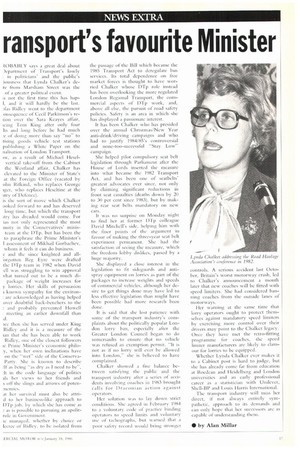ransport's favourite mister
Page 17

If you've noticed an error in this article please click here to report it so we can fix it.
ZOBABLY says a great deal about kpartment of Transport's lowly in politicians and the public's • iousness that Lynda Chalker's dere from Marsham Street was the • of a greater political event.
not the first time this has hap1, and it will hardly he the last. alas Ridley went to the department amsequence of Cecil Parkinson's reLion over the Sara Keayes affair, icing loin King after only four las and long before he had much 7e. of doing more than say "no" To rising goods vehicle test stations publishing a White Paper on the nalisation of Loudon Transport.
as a result of Michael Heselvertical take-off from the Cabinet the Westland affair, Chalker has elevated to the Minister of State's at the Foreign Office (vacated by ohn Rifkind, who replaces George iger, who replaces Heseltine at the stry of Defence).
is the sort of move which Chalker poked forward to and has deserved long time, but which the transport try has dreaded would come. For las not only represented the most nuicy in the Conservatives' ministeam at the DTp, but has been the to paraphrase the Prime Minister's 1 assessment of Mikhail Gorbachev, whom it ti:els it can do business.
e and the since knighted and allbrgotten Reg Eyre were drafted the DTp team in 1982 when David 'ell was struggling to win approval vhat turned out to be a much dipackage of weight increases for y lorries. Her skills of persuasion a known sympathy for the environ: are acknowledged as having helped over doubtful back-benchers to the and probably prevented Howell meeting an earlier downfall than id.
ice then she has served under King Ridley and it is a measure of the Ian that she has been able to work Ridley, one of the closest followers le Prime Minister's economic philoy, ‘,vhen her own inclinations have on the "wet" side of the ConservaParry. She is known to describe lf as being "as dry as I need to be-, :h in the code language of politics als her views to her friends and s off the slings and arrows of potennenikS.
Lit her survival must also be attrid to her business-like approach to lirp job, by which she has come as as is possible to pursuing an apolitrole in Government.
ie managed, whether by choice or leeree of Ridley, to be isolated from the passage of the Bill which became the 1985 Transport Act to deregulate bus services. Its total dependence on free market forces is thought to have worried Chalker whose DTp role instead has been overlooking the more regulated London Regional Transport, the commercial aspects of DTp work, and, above all else, the pursuit of road safety policies. Safety is an area in which she has displayed a passionate interest.
It has been Chalker who has presided over the annual Christmas/New Year anti-drink/driving campaigns and who had to justify 1984/85's controversial and none-too-successful "Stay Low" campaign.
She helped pilot compulsory seat belt legislation through Parliament after the House of Lords inserted the measure into what became the 1982 Transport Act, and has been one of seatbelts' greatest advocates ever since, not only by claiming significant reductions in front seat casualties (deaths down by 20 to 30 per cent since 1983), but by making rear seat belts mandatory on new cars.
It was no surprise on Monday night to find her at Rimier Dip colleague David Mitchell's side, helping him with the finer points of the argument in favour of making the three-year seat belt experiment permanent. She had the satisfaction of seeing the measure, which the freedom lobby dislikes, passed by a huge majority.
She displayed a close interest in the legislation to fit sideguards and anti spray equipment on lorries as part of the packages to increase weights and speeds of commercial vehicles, although her de sire to get things done may have led to less effective legislation than might have been possible had more research been done.
It is said that she lost patience with sonic of the transport industry's complaints about the politically popular London lorry ban, especially after the Greater London Council began to do somersaults to ensure that no vehicle was reliased an exemption permit. "It is
not as if no lorry will ever be allowed into London,she is believed to have complained.
Chalker showed a fine balance between satisfying the public and the transport industry after a series of accidents involving coaches in 1983 brought calls for Draconian action against operators. Her solution was to lay clown strict conditions. She agreed in February 1984 to a voluntary code of practice binding operators to speed limits and voluntary use of tachographs, but warned that a poor safety record would bring stronger controls. A serious accident last October, Britain's worst motorway crash, led to Chalker's announcement a month later that new coaches will be fitted with speed limiters. She had considered banning coaches from the outside lanes of motorways. Her warning at the Sallie time that lorry operators ought to protect themselves against mandatory speed limiters by exercising more control over their drivers may point to the Chalker legacy. Once they have met the retro-titting programme for coaches, the speed limner manufacturers are likely to Clamour for lorries to be equipped.
Whether Lynda Chalker ever makes it to a Cabinet post is hard to judge, but she has already come far from education at Roedean and Heidelberg and London universities and an early professional career as a statistician with Unilever, Shell-BP and Louis Harris International.
The transport industry will miss her direct, if not always entirely sympathetic, approach to its demands and can only hope that her successors are as capable of understanding them.






















































